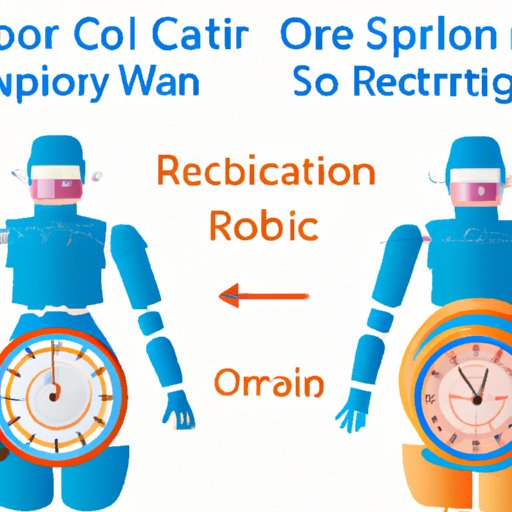Introduction
Robotic colon resection surgery is a minimally invasive procedure used to remove part or all of the large intestine. This type of surgery is typically used to treat conditions such as cancer, diverticulitis, and inflammatory bowel disease. Robotic colon resection surgery is a complex procedure that requires the skill of a highly trained surgeon and the use of specialized medical equipment.
The benefits of robotic colon resection surgery include less pain and scarring, shorter hospital stays, faster recovery times, and improved surgical outcomes. However, there are also risks associated with this procedure, including the potential for infection and complications related to anesthesia.
Comparing Open and Robotic Colon Resection Surgery
Open colon resection surgery is the traditional approach to removing part or all of the large intestine. During this procedure, the surgeon makes a long incision in the abdomen and then manually removes the affected area. The advantage of this technique is that it can be used to access difficult-to-reach areas of the digestive system.
In contrast, robotic colon resection surgery uses a robotic device to make small incisions in the abdomen. The surgeon then controls the device from a console, allowing them to view the internal organs and perform the surgery without having to make large incisions. The advantages of this technique include improved precision and accuracy, as well as a lower risk of complications.
According to a study published in the World Journal of Gastroenterology, “Robotic colorectal surgery has been shown to reduce blood loss and postoperative pain, shorten hospital stays, and provide better cosmesis compared to the conventional laparoscopic and open approaches.” 1
An Overview of Robotic Colon Resection Surgery Procedures
Robotic colon resection surgery can be used to treat a variety of conditions, including cancer, diverticulitis, and inflammatory bowel disease. Depending on the patient’s condition, the surgeon may perform a partial or complete removal of the large intestine.
During the procedure, the surgeon will make several small incisions in the abdomen. Through these incisions, the surgeon will insert a camera and robotic arms that contain surgical instruments. The surgeon will then use the camera and robotic arms to remove the affected area of the large intestine.
In some cases, the surgeon may need to reconnect the remaining sections of the large intestine. To do this, they will use sutures, staples, or a combination of both.

Understanding the Length of Robotic Colon Resection Surgery
The average length of a robotic colon resection surgery is between two and four hours. However, the exact length of the procedure will vary depending on the complexity of the case and the skills of the surgeon.
In addition, the length of the procedure can be affected by factors such as the size of the affected area, the number of incisions made, and the type of reconstruction needed. For example, if the surgeon needs to reconnect the remaining sections of the large intestine, the procedure may take longer than expected.

Examining the Recovery Time of Robotic Colon Resection Surgery
Following the procedure, the patient will typically stay in the hospital for three to five days. During this time, the patient will receive intravenous fluids and antibiotics to prevent infection. In addition, they may also require pain medication to manage any discomfort.
Once the patient is discharged from the hospital, they will need to follow a specific diet to aid in their recovery. This will include avoiding certain foods such as dairy products, processed meats, and fried foods. The patient should also drink plenty of fluids and eat high-fiber foods to help promote digestion.
The Pros and Cons of Robotic Colon Resection Surgery
Robotic colon resection surgery offers many potential benefits, including less pain and scarring, shorter hospital stays, faster recovery times, and improved surgical outcomes. Additionally, because the procedure is minimally invasive, patients may experience fewer complications and a quicker return to normal activities.
However, the procedure does come with some risks. These include the potential for infection and complications related to anesthesia. In addition, robotic colon resection surgery is more expensive than traditional open colon resection surgery.

What to Expect During a Robotic Colon Resection Surgery
Prior to the procedure, the patient will need to undergo a series of tests to determine if they are a good candidate for robotic colon resection surgery. These tests may include a physical exam, blood work, and imaging scans.
During the procedure, the patient will be under general anesthesia and will not feel any pain. However, they may experience some discomfort during the recovery period. To manage this, the patient may be prescribed medications such as pain relievers and anti-nausea drugs.
After the procedure, the patient will need to follow their doctor’s instructions for post-operative care. This may include taking antibiotics, getting adequate rest, abstaining from strenuous activities, and avoiding certain foods.
Conclusion
Robotic colon resection surgery is a minimally invasive procedure used to remove part or all of the large intestine. This type of surgery offers many potential benefits, including less pain and scarring, shorter hospital stays, faster recovery times, and improved surgical outcomes. The average length of a robotic colon resection surgery is between two and four hours, and the recovery time is typically three to five days. However, there are also risks associated with the procedure, including the potential for infection and complications related to anesthesia. Patients should speak with their doctor to learn more about the risks and benefits of robotic colon resection surgery.
(Note: Is this article not meeting your expectations? Do you have knowledge or insights to share? Unlock new opportunities and expand your reach by joining our authors team. Click Registration to join us and share your expertise with our readers.)
